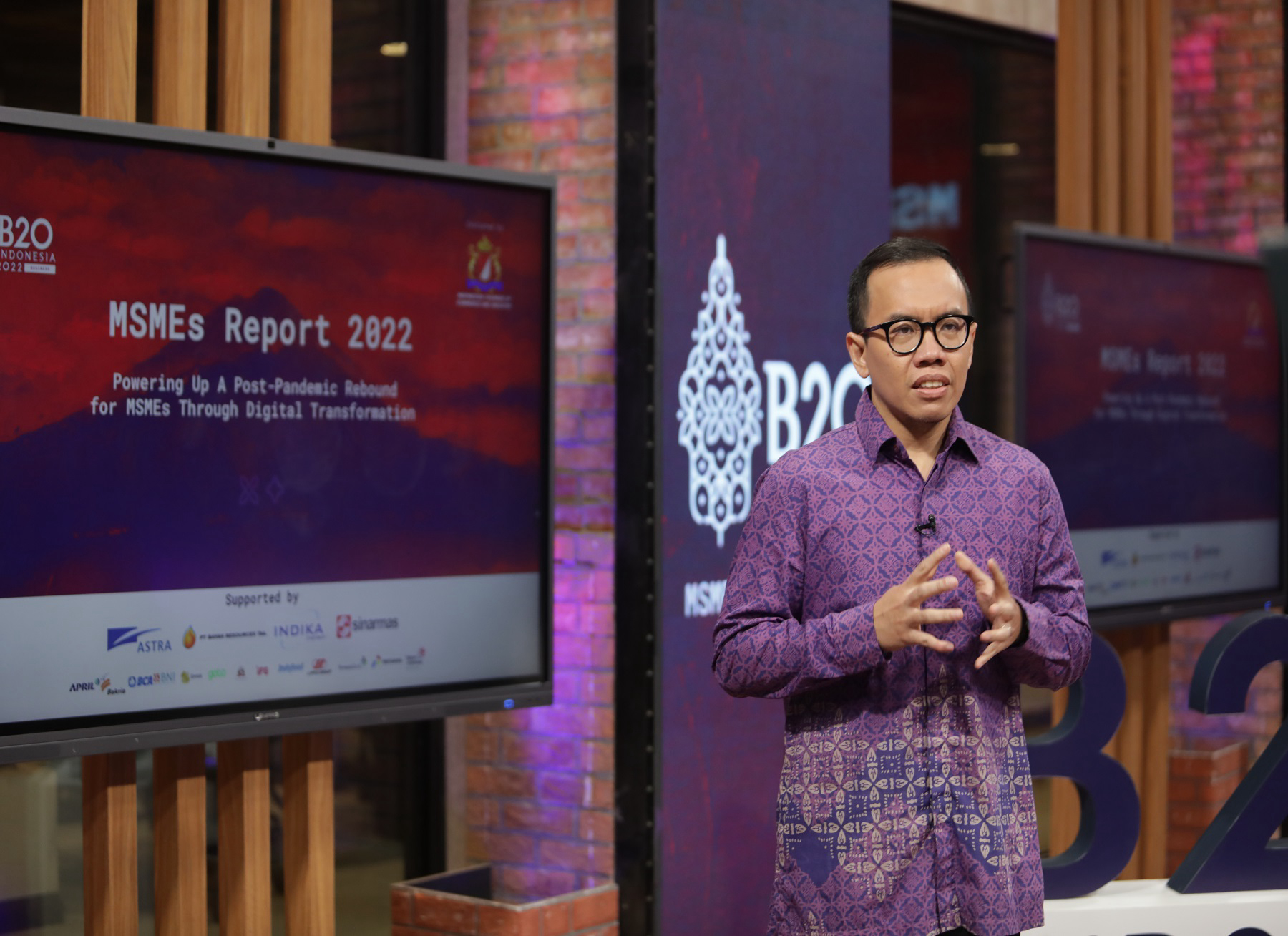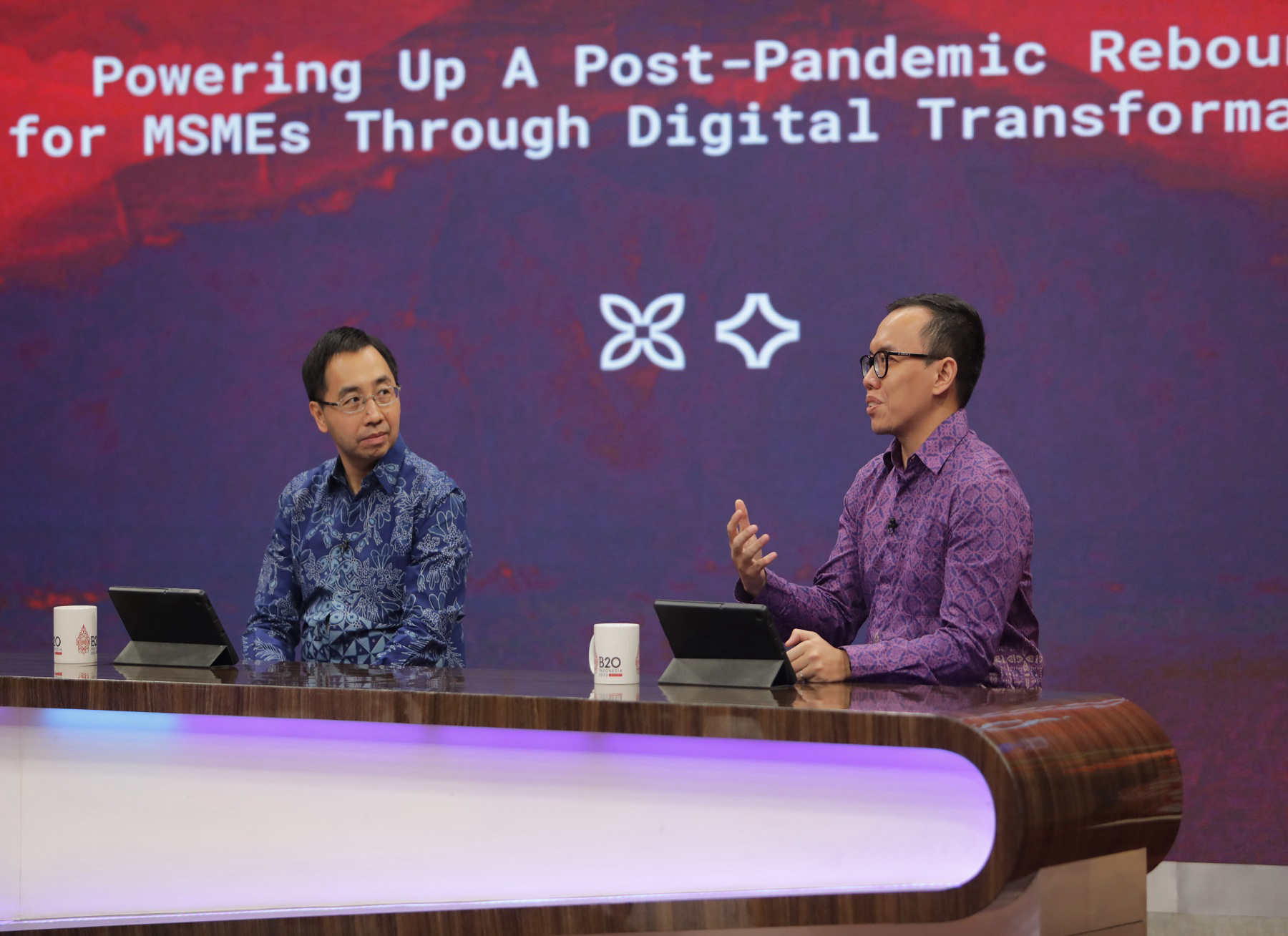 Photo Description: B20 Digitalization Deputy Chair as well as Telkom Digital Business Director Fajrin Rasyid delivered his presentation on the results of a study conducted by Telkom and BCG at the B20 Digitalization Task Force side event, MSMEs Report 2022.
Photo Description: B20 Digitalization Deputy Chair as well as Telkom Digital Business Director Fajrin Rasyid delivered his presentation on the results of a study conducted by Telkom and BCG at the B20 Digitalization Task Force side event, MSMEs Report 2022.
 Photo Description: Telkom Digital Business Director Fajrin Rasyid (right) with BCG Managing Director and Partner Davids Tjhin (left) in a discussion session during the launch of Telkom and BCG's MSMEs Report 2022.
Photo Description: Telkom Digital Business Director Fajrin Rasyid (right) with BCG Managing Director and Partner Davids Tjhin (left) in a discussion session during the launch of Telkom and BCG's MSMEs Report 2022.
Jakarta, 7 September 2022 - The micro, small and medium enterprise (MSMEs) sector plays a vital role in the global economy. About 90% of global business and half of global employment depend on MSMEs.
The importance of MSMEs to the world economy has become one of the factors that Indonesia's B20-G20 Presidency raised MSMEs empowerment as a priority issue. Moreover, MSMEs have also been significantly affected by the Covid-19 pandemic.
In this regard, the B20 Digitalization Task Force held a side event featuring a panel discussions to launch the MSMEs Reports 2022, a study that PT Telkom Indonesia (Persero) Tbk (Telkom) and the Boston Consulting Group (BCG) conducted on the impact of digitalization to MSMEs recovery and empowerment Wednesday (1/9/2022) at the SEA Today studio, Jakarta. SeaToday is Telkom Indonesia and BCG main media partner to promote and disseminate information about MSME Reports 2022 to the national and international audience, and it is expected to help strengthen MSME business in Indonesia.
The launch of the study featured two speakers, B20 Digitalization Deputy Chair and Telkom Digital Business Director Fajrin Rasyid and BCG Managing Director and Partner, Davids Tjhin.
The BCG and Telkom Indonesia study, titled "Powering up a post-pandemic rebound for MSMEs through digital transformation" showed how digitization has contributed greatly to more than 60% of MSMEs in finding customers and suppliers of the goods they trade.
B20 Digitalization Deputy Chair as well as Telkom Indonesia Digital Business Director, Fajrin Rasyid, said in a developing country like Indonesia, the MSME sector is the main pillar of the national economy that contributes 60% to GDP. "The results of our research are in accordance with a 2021 data from the Ministry of Cooperatives and SMEs which showed that SMEs provided employment for 97 percent or 117 million workers, of which 64.5 percent were women and empowered the local economy," Fajrin said.
Apart from showing the positive impact of digital platforms for MSMEs, the report also shows how they are facing big challenges during the COVID-19 pandemic. During the pandemic, many MSMEs went bankrupt due to restrictions on social mobility, while others lacked the capital to expand their businesses.
Regarding the impact of Covid-19 on MSMEs, BCG Managing Director and Partner, Davids Tjhin sees that MSME businesses continue to face challenges, especially during the pandemic and this has a very serious impact on the household economy.
"In research conducted by BCG and Telkom, the impact of the pandemic on Indonesia, especially in the business sector, is very serious. All business sectors, both large-scale companies and MSMEs, experienced a decline in income of more than 80%," Davids said.
Davids said the problem lies with MSMEs' classic problems that have gotten worse with the pandemic. Funding support (57%) was the most significant challenge, followed by difficulties in digital learning and training centers (49%), regulatory support (43%), and the need for consulting services or business assistance (32%).
Strategic Steps to Overcome Obstacles
Furthermore, Fajrin also said digital transformation provided an important platform to support and increase opportunities for MSMEs during this challenging period. Digital technology, he continued, can provide invaluable access to ensure business continuity when accessing new markets that are developing nationally, regionally and globally.
"Digital technology also provides useful channels for increasing operational efficiency, optimizing processes and ways of working, and reducing ongoing business costs," Fajrin added.
To overcome the obstacles that MSME actors experienced, Telkom Indonesia and BCG research provides six strategic recommendations that can support MSME digital transformation. First, the use of digital technology to set strategies, market research related to products that consumers are interested in. Second, using an e-commerce platform or cloud technology to help MSMEs find suppliers of goods and services and build collaborations that enable business actors in this sector to build digital infrastructure in an effective and measurable manner.
Third, MSMEs will gain access to a wider market. Fourth, adopting digital technology will make MSME actors improve their skills and knowledge related to digitalization. Fifth, MSMEs can easily access financing. This of course must also be supported by the government and private institutions that provide access to fair and sustainable financing for MSMEs.
Sixth, to encourage digital transformation for MSMEs, it requires supportive regulations or policies, especially those that can maintain a balance between MSMEs and large companies. These regulations can include policies on tax incentives and recognition of intellectual property rights (IPR).
#DigitalBisa
#UntukIndonesiaLebihBaik